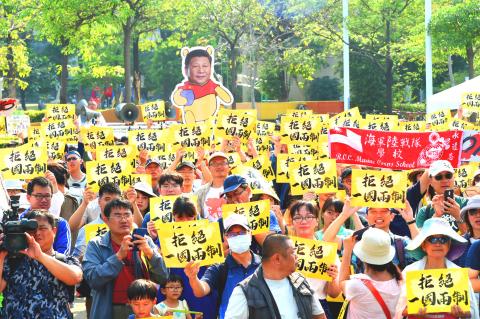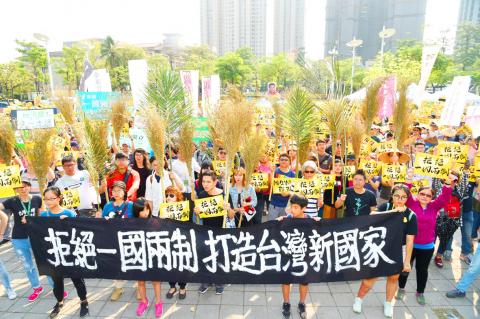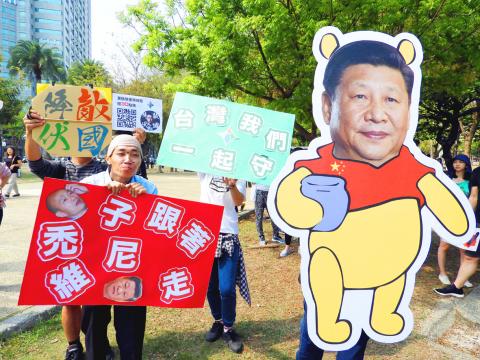A group of about 1,000 people yesterday protested in Kaohsiung’s Labor Park against China’s proposal to implement a “one country, two systems” framework in Taiwan.
The march, organized by Citizen Front Taiwan, also protested Kaohsiung Mayor Han Kuo-yu’s (韓國瑜) visits last month to China’s liaison offices in Hong Kong and Macau.
Critics said the visits were inappropriate and suggested that Han accepts China’s “one country, two systems” model.

Photo: Chang Chung-yi, Taipei Times
The protesters shouted “Today Hong Kong, tomorrow Taiwan” and “Reject ‘one country, two systems,’ resist Chinese annexation” and other slogans.
By visiting the offices and signing a memorandum of understanding on fruit exports with Chinese officials, Han is “returning to the old ways of [former president Ma Ying-jeou’s (馬英九)] administration,” Sunflower movement leader Lin Fei-fan (林飛帆) told the crowd, accusing Han of “locking Taiwan into a ‘one China’ framework” in the name of boosting the economy.
Ma “placed all of Taiwan’s resources into China” during his presidency, like putting all of one’s eggs in one basket, Lin said.

Photo: Chang Chung-yi, Taipei Times
As a result, Taiwan’s economy became reliant on China, he said.
“Are we going to go back to the old ways?” he asked.
Han did not give prior notice of his visits to the offices, said Citizen of the Earth, Taiwan chairman Lee Ken-cheng (李根政), who also serves as an organizer of Citizen Front Taiwan.

Photo: Ko Yu-hao, Taipei Times
By entering the offices, Han “cooperated with Chinese President Xi Jinping’s (習近平) ‘united front’ strategy,” Lee said.
Biased information from China makes it impossible for people to access correct information, Citizen Front Taiwan organizer Shen Pai-yang (沈柏洋) said.
National security officials need to act on the “information war” the nation is facing. Many countries are slowly being infiltrated by China, but the most serious case is Taiwan, which is the least able to resist infiltration, he added.
Edith Cheung (鍾慧沁), who in September last year immigrated from Hong Kong, said Hong Kongers only became poorer after the “one country, two systems” model was implemented there.
Real-estate prices went up due to Chinese buyers, and young Hong Kongers, faced with competition from China, could not find jobs, she said.
Charng Mei (常美冰店), an ice cream store in Cishan District (旗山), showed its support by sending 300 popsicles to the protesters.
The Kaohsiung City Police Department dispatched 100 police officers to the park to prevent any clashes between the protesters and members of the public.

CHAOS: Iranians took to the streets playing celebratory music after reports of Khamenei’s death on Saturday, while mourners also gathered in Tehran yesterday Iranian Supreme Leader Ayatollah Ali Khamenei was killed in a major attack on Iran launched by Israel and the US, throwing the future of the Islamic republic into doubt and raising the risk of regional instability. Iranian state television and the state-run IRNA news agency announced the 86-year-old’s death early yesterday. US President Donald Trump said it gave Iranians their “greatest chance” to “take back” their country. The announcements came after a joint US and Israeli aerial bombardment that targeted Iranian military and governmental sites. Trump said the “heavy and pinpoint bombing” would continue through the week or as long

TRUST: The KMT said it respected the US’ timing and considerations, and hoped it would continue to honor its commitments to helping Taiwan bolster its defenses and deterrence US President Donald Trump is delaying a multibillion-dollar arms sale to Taiwan to ensure his visit to Beijing is successful, a New York Times report said. The weapons sales package has stalled in the US Department of State, the report said, citing US officials it did not identify. The White House has told agencies not to push forward ahead of Trump’s meeting with Chinese President Xi Jinping (習近平), it said. The two last month held a phone call to discuss trade and geopolitical flashpoints ahead of the summit. Xi raised the Taiwan issue and urged the US to handle arms sales to

State-run CPC Corp, Taiwan (CPC, 台灣中油) yesterday said that it had confirmed on Saturday night with its liquefied natural gas (LNG) and crude oil suppliers that shipments are proceeding as scheduled and that domestic supplies remain unaffected. The CPC yesterday announced the gasoline and diesel prices will rise by NT$0.2 and NT$0.4 per liter, respectively, starting Monday, citing Middle East tensions and blizzards in the eastern United States. CPC also iterated it has been reducing the proportion of crude oil imports from the Middle East and diversifying its supply sources in the past few years in response to geopolitical risks, expanding

Pro-democracy media tycoon Jimmy Lai’s (黎智英) fraud conviction and prison sentence were yesterday overturned by a Hong Kong court, in a surprise legal decision that comes soon after Lai was jailed for 20 years on a separate national security charge. Judges Jeremy Poon (潘兆初), Anthea Pang (彭寶琴) and Derek Pang (彭偉昌) said in the judgement that they allowed the appeal from Lai, and another defendant in the case, to proceed, as a lower court judge had “erred.” “The Court of Appeal gave them leave to appeal against their conviction, allowed their appeals, quashed the convictions and set aside the sentences,” the judges